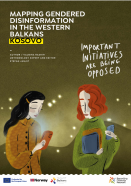MAPPING GENDERED DISINFORMATION IN THE WESTERN BALKANS – KOSOVO
July 9, 2025
It is more likely for dinosaurs to come down on earth and say hello to us, than it is likely for disinformation to disappear. This is the opening statement of Lindita Tahiri, professor of Language and English literature, with whom Kosovo 2.0 met, in attempting to deconstruct the ways disinformation has gained such significant ground in Kosovo, from an academic perspective.
Beyond disinformation alone, gender disinformation proves even more complex, as it is closely linked to anti-gender discourse as well as hate speech, a growing problem being pointed out by feminist activists in Kosovo. In public discourse, anti-gender narratives are often framed as protective efforts to uphold traditional values and family structures, or as gender disinformation that serves nationalist, populist, and frequently religiously driven agendas. These narratives primarily target women, LGBTIQ+ individuals, and particularly children – both girls and boys, who are exposed to educational content shaped by distorted gender norms and stereotypes.
Although journalists consider these labels such as the anti-gender movement or anti-gender narratives to be considerably new to the reporting discourse4, they note, however, that gender disinformation has been present all along, working its way through gender based discrimination, stigmatisation as well as legislation.
In 2018, several discussions arose concerning the inconsistency between the Kosovar Law on Civil Status and the Constitution of Kosovo, triggered by Blert Morina’s request to modify his name and sex marker in official documents. As of 2021, Kosovo’s draft Civil Code has been pending for ratification from the assembly. The public debate as well as the disinformation following discussions about it had severe impact on the LGBTIQ+ community, as well as human right defenders who worked to push forward the draft Civil Code. Later on, the draft Law on Reproductive Rights and Medically Assisted Conception became the backbone for the formation of a conservative political party, the Coalition for the Family. Hate speech and disinformation evolved around what the law would bring, with speculation about incest and the destruction of the “traditional” family.
Therefore, this research will seek information from both qualitative and quantitative approaches. On the qualitative part, the research will be informed by eight interviews with journalists, activists and an academic.
Furthermore, the qualitative part will draw significantly from articles and headlines used by various media, to promote gender disinformation covering the timeframe from 2021 to 2025. Whereas both the qualitative and the quantitative approach will also be informed by pre-existing research on topics such as: anti-gender movement, gender based discrimination, gender-sensitive reporting, including research conducted on the matter from the Regional Diversity Network, Kosovo 2.0, BIRN Kosovo, Center for Critique and Action (QIKA), and others noted below.

Download MAPPING GENDERED DISINFORMATION IN THE WESTERN BALKANS - KOSOVO
